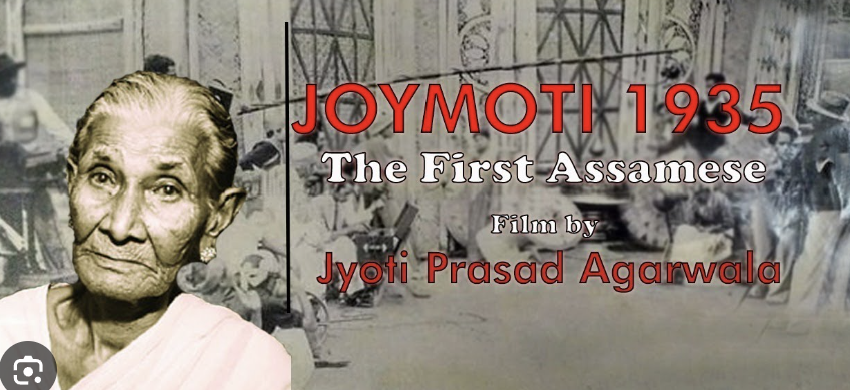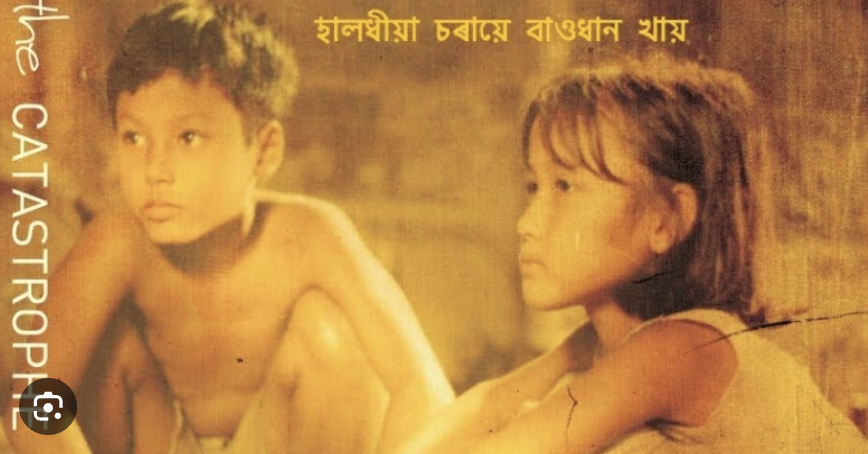
Table of Contents
5 Must Watch Assamese Movies
Assamese movies, while not as widely recognized as Bollywood or other regional cinemas in India, holds its own unique charm and allure. In this blog post, we explore the lesser-known world of Assamese movies and shine a spotlight on seven remarkable movies that deserve recognition. From tales of resilience and resistance to poignant reflections on love and identity, these films showcase the rich cultural heritage and artistic prowess of Assam. Join us on a cinematic journey through the heartland of Northeast India as we discover the magic of Assamese cinema and its enigmatic appeal.
1. Halodhia Choraye Baodhan Khai

Release Date: 1987
Star Cast: Biju Phukan, Sushil Goswami, Indra Bania
Directed By: Jahnu Barua
Storyline of the Assamese Movie “Halodhia Choraye Baodhan Khai”
Set in rural Assam, this one among other great Assamese movies follows the journey of Gunai, a poor farmer, and his family as they struggle to survive amidst societal injustices and natural calamities. With his land threatened by floods and his crops destroyed by pests, Gunai finds himself caught in a cycle of poverty and despair. Despite facing numerous challenges, Gunai remains determined to provide for his family and protect his land from exploitation by powerful landlords. As the story unfolds, Gunai’s resilience and courage are put to the test, leading to a gripping climax that underscores the indomitable spirit of the human will.
Why Watch the Assamese Movie “Halodhia Choraye Baodhan Khai”
The cinema is a masterpiece of Assamese movies, offering a compelling narrative, powerful performances, and insightful commentary on social issues. It provides a poignant portrayal of the human condition and the resilience of the human spirit.
2. “Xagoroloi Bohu Door” (It’s a Long Way to the Sea)

Release Date: 1995
Star Cast: Sushil Goswami, Bishnu Kharghoria, Indra Bania
Directed By: Jahnu Barua
Storyline of the Assamese Movie “Xagoroloi Bohu Door”
The storyline of this Assamese movie moves around the character Powal, an elderly boatman of a quaint village called Nemaguri, Assam. He spends his days ferrying passengers across the river Dihing, a trade passed down through generations. Life for Powal and his grandson, Hkhuman, seems stable until rumors of a new bridge threaten to disrupt their way of life. Powal grapples with the impending changes, torn between tradition and progress.
As Powal tries to adapt to the changing times, he reaches out to his relatives in the city, seeking solace and support. However, his efforts only lead to disillusionment as he discovers the fleeting nature of modern relationships. The film sheds light on the struggles of rural life in the face of rapid development, where the government neglects to provide alternatives for those affected.
Despite the challenges, Powal clings to hope, his weary eyes reflecting a glimmer of resilience. The story delves into the human cost of progress, portraying Powal’s plight as emblematic of the sacrifices made in the name of modernization.
The narrative unfolds in two parts, with Powal’s relationship with his grandson serving as the emotional core. Their bond represents the clash between tradition and modernity, as they navigate the uncertainty of their changing world.
In the end, the construction of the bridge by corrupt politicians and bureaucrats symbolizes the loss of Powal’s ancestral livelihood. The film’s poignant portrayal of Powal’s struggle resonates with themes of resilience, family, and the harsh realities of progress. Through Powal’s journey, the film offers a poignant reflection on the price paid for development, leaving viewers with a profound sense of empathy and introspection.
Why Watch “Xagoroloi Bohu Door”?
This Assamese movie offers a visually stunning portrayal of life on the river islands, coupled with a heartfelt narrative that captures the essence of Assamese culture and tradition. It offers a poignant and thought-provoking portrayal of the human cost of progress and development.
Through the story of Powal, a boatman facing the threat of losing his livelihood to a new bridge, the film delves into themes of tradition, modernity, and the impact of change on rural communities. The emotional depth of Powal’s journey, coupled with the nuanced exploration of familial relationships and societal dynamics, makes this film a compelling watch.
Additionally, the stellar performances and evocative cinematography capture the essence of rural Assam, immersing viewers in its rich cultural heritage and natural beauty. Ultimately, the movie offers a powerful commentary on the complexities of development and the resilience of the human spirit in the face of adversity, making it a must-watch for anyone interested in compelling storytelling and social commentary.
3. Aparoopa

Release Date: 1982
Star Cast: Biju Phukan, Suhasini Mulay, Sushil Goswami and Girish Karnad
Directed By: Jahnu Barua
Storyline of the Assamese Movie “Aparoopa”?
The film tells the story of a young woman named Aparoopa who struggles to find her identity and assert her independence in a patriarchal society. As she navigates the challenges of love and family, Aparoopa must confront societal norms and expectations.
“Aparoopa” unfurls in colonial Assam’s tea plantations, where Aparoopa, wed to a tea estate owner, feels suffocated in her golden cage. Learning her marriage was a financial pact, she seeks solace in her old flame, Rana, sparking a tumult of emotions. As Aparoopa grapples with societal expectations and personal desires, her journey intertwines with Radha’s, a woman challenging village norms. Jahnu Barua’s debut weaves Assamese culture, folk songs, and dances into a poignant narrative. Through Aparoopa’s plight, the film navigates love, identity, and societal constraints, leaving viewers pondering the human condition amidst changing times.
Why Watch the Assamese Movie “Aparoopa”?
This movie offers a poignant portrayal of a woman’s journey towards self-discovery and empowerment. It explores themes of love, freedom, and social change with sensitivity and depth.
4. Ajeyo (Invincible)

Release Date: 2014
Star Cast: Kopil Bora, Jupitora Bhuyan, Bishnu Khargoria, Arun Nath
Directed By: Jahnu Barua
Storyline of Ajeyo (Invincible)
In the backdrop of pre-independent Assam in 1946, “Ajeyo” unveils the compelling narrative of Gojen Keot, a staunch follower of Mahatma Gandhi, driven by the belief that freedom will eradicate social injustices. Set in the rural village of Hunaruchuk, the film chronicles Gojen’s valiant struggle against the exploitation perpetuated by the affluent elite, symbolized by the town’s richest man.
Based on Arun Sarma’s Sahitya Akademi Award-winning novel “Ashirbador Rong,” “Ajeyo” captures the essence of Gojen’s relentless fight against land-grabbing, child marriage, and caste discrimination amidst the fervor of the freedom movement. Through Gojen’s perspective, viewers witness pivotal moments in his life, including a haunting incident during the freedom struggle that leaves him grappling with guilt and moral conflict.
Why Watch the Assamese Movie “Ajeyo”?
“Ajeyo” offers a multi-layered exploration of social and political themes, from corruption to caste politics, set against the backdrop of Assam’s historical and contemporary landscape. Jahnu Barua’s masterful storytelling weaves together the complexities of Gojen’s journey, resonating with audiences as they navigate the nuances of a changing society. With its richly textured narrative and compelling characters, “Ajeyo” invites viewers on a thought-provoking journey through the triumphs and tribulations of one man’s quest for justice and freedom.
5. “Village Rockstars”

Release Date: 2017
Star Cast: Bhanita Das, Basanti Das, Bolaram Das
Directed By: Rima Das
Storyline of “Village Rockstars”
“Village Rockstars” transports viewers to the serene village of Chhayagaon in Assam, where the spirited Dhunu, a 10-year-old daughter of a widow, challenges societal norms with her unwavering determination to form a rock band. Set against the backdrop of nature’s grandeur and the harsh realities of village life, the film celebrates Dhunu’s resilience and her bond with the natural world.
Through minimal dialogue and immersive cinematography, “Village Rockstars” captivates audiences with its raw authenticity and profound storytelling. The film beautifully intertwines themes of feminism, empowerment, and the indomitable human spirit, offering a poignant reflection on the transformative power of acceptance and support.
As Dhunu navigates the challenges of growing up in a world shaped by nature’s whims and societal expectations, viewers are drawn into a tale of hope, resilience, and the enduring strength of the human spirit. With its breathtaking visuals and evocative sound design, “Village Rockstars” invites audiences to immerse themselves in Dhunu’s world and experience the beauty and resilience of life in rural Assam.
Why Watch the Assamese Movie “Village Rockstars”?
“Village Rockstars” is a cinematic masterpiece in the world of Assamese movies that celebrates the triumph of the human spirit amidst adversity. Through its poignant storytelling and captivating visuals, the film offers a powerful commentary on empowerment, resilience, and the enduring bond between humanity and nature. As Dhunu defies societal norms and follows her dreams, viewers are inspired to embrace their own aspirations and find strength in the face of challenges. “Village Rockstars” is not just a movie; it’s a celebration of hope, resilience, and the beauty of the human spirit, making it a must-watch for audiences seeking inspiration and upliftment.
The World of Assamese Movies: Conclusion
The world of Assamese movies offers a rich tapestry of culture, tradition, and storytelling that captivates audiences with its authenticity and depth. From exploring the intricacies of rural life to delving into the complexities of social issues, Assamese cinema continues to evolve and thrive, reflecting the diverse experiences and perspectives of its people.
Through its unique blend of narrative styles, visual aesthetics, and thematic exploration, Assamese movies have carved a niche for themselves in the global cinematic landscape. With each film, directors and filmmakers strive to push boundaries, challenge conventions, and shed light on pressing issues facing society, making Assamese movies an integral part of India’s vibrant film industry. As audiences continue to embrace and celebrate Assamese movies, it is evident that the world of Assamese cinema holds immense potential to inspire, educate, and entertain viewers around the world. With its rich storytelling tradition and commitment to authenticity, Assamese cinema promises to continue enchanting audiences for generations to come.


